There is less than a week left until Kosovars head for the ballot boxes to choose their new legislature, and consequently their new government. These early national elections have been called after the Assembly, including deputies from the ranks of one of the partners of the coalition government, voted for a motion that collapsed Isa Mustafa’s and LDK’s government on May 10 almost a year before the four year mandate was due to end. Tensions surrounding this year’s general elections are already being made visible through the sometimes megalomaniac slogans and promises of the political parties running.
The election campaign officially began on Wednesday (May 31), though pre-election coalition agreements had already been signed at the beginning of the election process. Now Kosovars will have the opportunity to choose between the so-called “war wing” (the PDK, AAK and Nisma coalition, with Ramush Haradinaj as candidate for Prime Minister); the so-called “peace” coalition (comprised of LDK, AKR and Alternativa, with Avdullah Hoti as their candidate); and Vetevendosje, with Albin Kurti as their candidate.
To ensure that votes for these parties go to the right place, and that voter rights are not breached on election day (June 11), the Central Election Commission (CEC), determined by the Law for General Elections in Kosovo as an independent body of experts who are responsible for administering elections, have enabled local and international non-governmental organizations to be certified for election monitoring.
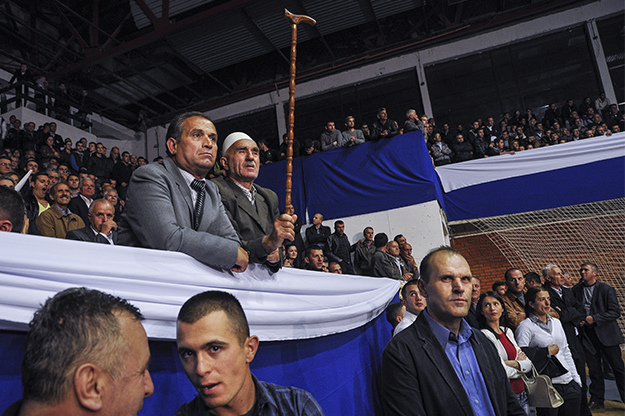
Photos from the most recent national elections. Photo: Atdhe Mulla / K2.0.
Politics in the CEC
Decisions made by the Central Election Commission (CEC) are conducted through a voting majority of the 11 members that comprise its body: the Head and 10 other members. The head is appointed by the President of the Republic of Kosovo and is elected from the body of judges of the Supreme Court. Currently, this position is held by judge Valdete Daka. The mandate for the head of the CEC lasts seven years, starting from the date in which the President informs the public about the appointment. The 10 other members of the CEC are appointed by nomination from the six biggest parliamentary groups of the Kosovo Assembly, while four more represent the minority communities in Kosovo. Currently, members of the CEC that are also part of political parties are, Betim Gjoshi and Ilir Gashi of PDK, Adnan Rrustemi of Vetevendosje, Binak Vishaj of AAK, Eshref Vishi of Nisma, Bajram Ljatifi of VAKAT, Ercan Spat of the Turkish Democratic Party of Kosovo, Nenad Rikalo of Serb List, and Ergjit Qeli of the Egyptian Liberal Party.
The period for the certification of monitoring personnel and organizations is expected to end on June 6, five days before general elections are held in Kosovo. Meanwhile, the CEC has informed the public that by now 2,000 people have been certified for monitoring. From the European Union Office in Kosovo alone around 100 people have been certified. The coalition of non-government organizations Democracy in Action, which has been led by the Kosovo Democratic Institute (KDI) since 2008, will have around 2,000 monitors throughout Kosovo.
The CEC also has a call center that will accept information for any irregularities regarding voting on election day. The State Prosecution office appointed special prosecutor Laura Pula as the institution’s coordinator for investigating possible penal acts during elections. Around 100 prosecutors are active during the election process for investigating possible violations. This also comes as a result of a memorandum that was signed on February 2, 2016 by the CEC, the State Prosecution, the Kosovo Police (KP), the Judicial Council of Kosovo (JCK), and the Election Complaint and Appeal Panel.
The objective of coordinating the actions of these institutions is to guarantee the right to vote and to eliminate election violations.
However, for people that have monitored preceding elections, these actions do not seem sufficient to eliminate potential violations this year. Some have even expressed concern that we could witness a repeat of the 2010 elections, which were generally perceived to be characterized by an “industrial theft” of votes.
Isuf Zejna from the non-governmental organization Demokracia monitored elections in Kosovo in 2007, initially as a watcher from the Ora organization, then as part of Democracy in Action, and ultimately as part of Democracy Plus. Zejna told K2.0 that the threat of attempts to manipulate the election process is evident this year, as it was in 2010, for many reasons.
“In the past it was said that commissioners were the ones who elect deputies, not citizens. This is a consequence of those commissioners transforming the will of the citizens during counting many times.”
Isuf Zejna - Project Officer at Monitoring organization Democracy Plus
“First of all,” Zejna notes, “these are early elections that will be organized within a very short time period. Thus institutions will not manage to make sufficient preparations, such as tidying up the electorate list, training election staff, and buying qualitative materials for elections.” According to Zejna, all of this can affect electoral integrity through violations, and make elections more prone to fraud and abuse.
“Second of all,” he continues. “Election results are expected to be very close between coalitions and political parties. Also, candidates will attempt to get as many votes as they can for their lists. So candidates of the same list could manipulate votes that go to other candidates in that list. In the past it was said that commissioners were the ones who elect deputies, not citizens. This is a consequence of those commissioners transforming the will of the citizens during counting many times.”
Aftereffects of the past
It is particularly these manipulations and penal acts committed during the 2010 election year that have soured perceptions of elections and their organization in Kosovo.
The State Prosecution received 1,594 criminal complaints related to election day and national elections in 2010. Only a small number were settled with judicial decisions, including those that resulted in indictments.
A report published this year in March by non-governmental organization Lens, titled ‘vote secrecy and the processing of voter data,’ highlights the failure of the state to properly address manipulations conducted in 2010.
Lens stated that among the most frequently committed violations between the 2009 and 2014 elections were those related to the right to vote and to privacy, including: attempts by watchers or members of polling station councils to influence voters to vote for a certain party, interference during voting, family voting, misuse of assistance voting, voting outside the voting cabin, taking pictures of votes, threats and incidents, watchers keeping notes of the last names of persons in voter lists, buying votes, fraud during the process of counting in polling stations, etc.
The same report says that between 2009 and 2014, 1,619 penal acts were allegedly committed during elections. However, only 206 persons were sentenced for these acts.
“Election crimes have not been treated seriously and with priority by authorities,” the report states. “Bearing in mind the cyclical nature of election processes, these cases should be treated in due time.”
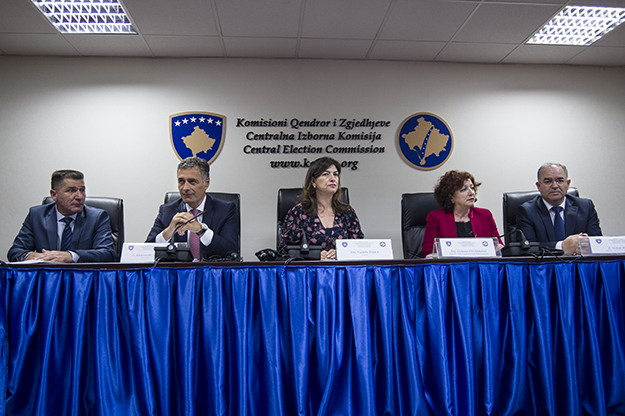
The joint conference held by the CEC, the Prosecution, the Police, the Election Complaint and Appeal Panel and the Judicial Council of Kosovo. Photo Atdhe Mulla / K2.0
On May 15th, the CEC held a conference with the head prosecutor of the state, Aleksander Lumezi, deputy director of the Kosovo Police, Naim Rexha, head of the JCK, Nehat Idrizi, and Gyltene Sylejmani, a member of the Election Complaint and Appeal panel. The representatives of all these institutions pledged their readiness for this year’s general elections, and said that they have undertaken all measures to prevent illegal acts.
However, when K2.0 asked the state prosecutor and the head of the JCK about how we could believe that there would be no manipulations this year, knowing the low number of sentences compared to the high number of criminal charges and indictments for manipulations in past elections, neither gave a concrete answer.
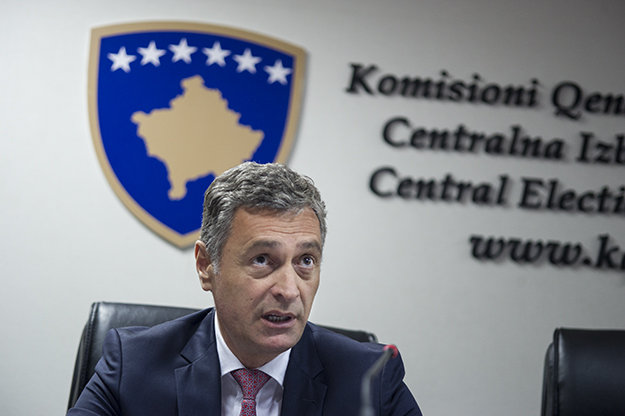
Head Prosecutor Aleksander Lumezi warned people of the risk of being sentenced with jail time in the event of possible electoral violations. Photo: Atdhe Mulla / K2.0
Head Prosecutor Lumezi said that the institution he represents has fulfilled all of its obligations, attributing exclusivity for sentencing to the courts.
But, according to him, the fact that police and the prosecution have proceeded as many as 1,594 cases and people for prosecution demonstrates the effect that this has had in raising awareness among citizens and commissioners involved in the election process, so that they do not misuse their official position.
“The result of that was that we had only 108 criminal charges proceeded in the prosecution and courts in 2014,” he said. “But even in the 2017 elections, if we have information and facts that prove that certain people have committed penal acts, we are convinced that the State Prosecution will fulfil its legal and constitutional duties and obligations.”
Meanwhile, the Head of the JCK, Nehat Idrizi, was not able to explain why there were so little sentences handed compared to the number of criminal charges and indictments for manipulations in the 2010 elections. In 2014, for example, no one was sentenced.
“I do not have the exact number of how many were finished, but the Judicial Council, in coordination with the courts, has treated these cases as a priority,” said Idrizi, adding that these cases will continue to be a priority for the council.
Soft sentences, mainly through fines, that courts gave for crimes during elections in the preceding years has become a controversial issue, despite the fact that the Penal Code foresees sentences with effective imprisonment for periods of up to five years. However, Idrizi said that at the Appeals Court, sentences were often changed from fines to effective imprisonment; although he did not provide any exact figures.
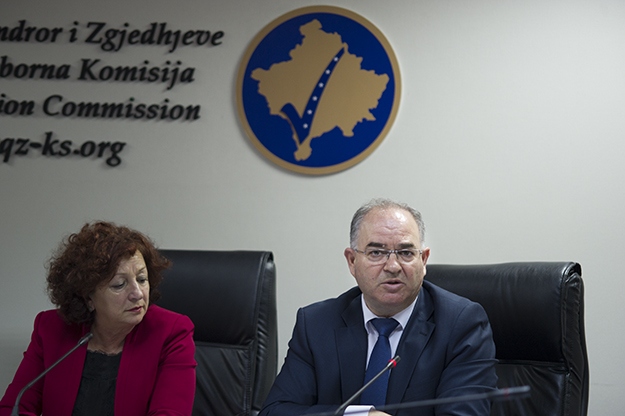
Head of the JDCK, Nehat Idrizi, did not give any justification for the low number of sentences for penal acts in the most recent elections. Photo: Atdhe Mulla / K2.0.
“We cannot comment on court decisions,” Idrizi stated. “The Appeals and Supreme courts respectively are the ones that review whether decisions were based on merit. The process in 2014 had a low number of cases particularly as a result of the sentences that were given after the 2010 elections.”
Meanwhile, the head of the CEC, Valdete Daka, said that any commissioner who was criminally charged in past elections was not allowed to partake in other elections, and the same would go for this year’s elections. “We’ve gone beyond presuming guilt, and have not engaged commissioners if they so much as had their names mentioned in criminal charges,” Daka said.
Head prosecutor Aleksander Lumezi also mentioned the need to reform the election system. For initiating these reforms, he sought the help of the media and civil society. “In the future, your pressure against executive and legislative institutions could influence reforms within the election system, so that we can have a regular and honest process,” he said.
"The problem with election organization in Kosovo does not lie in the legislation, rather it has to do with the people that execute these laws."
Isuf Zejna
In fact, the push for election reforms in Kosovo was particularly a result of the high number of violations in the 2010 general elections. The understanding was that reforms would affect the whole of the election system, the election threshold, and the lists. But they were never realized. Recently, election reforms were actualized by political leaders in 2016. President Hashim Thaci called a few round table meetings on the topic at the end of last year, although they were boycotted by the opposition.
One of Thaci’s first proposals made during last year’s meetings was related to constitutional changes for choosing the president through the vote of the people, and reducing the number of deputies, so that the Assembly would have not 120, but 100 seats.
However, Isuf Zejna from Democracy Plus says that the election system does not have deficiencies that leave space for potential manipulations. According to him, it is simply an issue of mobilizing judicial and electoral institutions.
“The same election system and legislation was in power in 2010 and in 2014. However, the quality of organization differed substantially. This best illustrates that the problem with election organization in Kosovo does not lie in the legislation, rather it has to do with the people that execute these laws,” Zejna said. “Violations are most frequently related to vote counting, or attempts to vote more than once.”

Isuf Zejna of Democracy Plus says that the short time period for organizing elections and pre-election coalitions could result in manipulations on June 11. Photo: Atdhe Mulla / K2.0.
According to Isuf Zejna, in 2010 the highest number of violations were committed in Drenas and Skenderaj municipalities respectively. But they were not the only ones. “In other municipalities, such as Gjakova and Prizren, we identified violations which breached election integrity,” Zejna told K2.0. “In many cases watchers are not the ones that commit these electoral crimes. The ones that commit electoral crimes are polling station members, known as commissioners.”
Voting privacy and e-voting
Voting privacy is a controversial issue in Kosovo, as many experts believe that the right to privacy is not sufficiently guaranteed, because in many cases it is violated as a result of deficiencies within the election system, and irresponsible actions of election organizers, watchers or other unauthorized persons which stay in polling stations.
Zejna of Demokracia Plus said that violations of privacy during voting have been also been committed during assistance voting, in cases when people are unable to vote independently, and need the help of others. “At this point, quite often it has been reported that one person assists many voters, and that this is against election rules”, he said.
"Publishing the voting list is a breach of privacy as it includes personal data which could be misused by political subjects, businesses and others”
Isuf Zejna
Zejna notes that family voting is also a concerning phenomenon, because in many cases, men interfere and decide who their family members vote for. According to him, this especially violates women’s right to privacy in voting.
Other cases that have been reported in past elections include people taking pictures of their vote slips, often being required to have evidence that they have voted for a certain subject or candidate. According to Zejna, this is a breach of privacy. Even the CEC database, which is supposed to help voters find their respective polling stations, in many cases publishes personal data for many people in an unauthorized manner.
“As such, whoever searches the first and last name of a person can also obtain a great deal of personal information, including their number and ID, among other things. Publishing the voting list is a breach of privacy as it includes personal data which could be misused by political subjects, businesses and others,” Zejna said.
An alternative to eliminate such violations was thought to be electronic voting, which was initially presented in Kosovo, through projects conducted at the University of Prishtina, by Personal Data Security professor and lecturer at the Department of Computer Sciences, Blerim Rexha. Albania tested the electronic voting system through two pilot projects, but eventually they failed, as they did not manage to secure voting machines with the necessary specifications.
In the conference held after the Lens organization report was published (March 2017), Rexha explained that electronic voting would help avert potential violations and generate faster (within hours) election results, positing that “this would eliminate the possibility of misusing or manipulating.”
However, in Kosovo, as he explained, this was thought to require an extremely high cost. This, coupled with difficulties in securing the necessary voting machines, which are also expensive, meant the idea was never put into practice.
Issues with the Diaspora
The diaspora voters’ list was published on May 28, and the next day the CEC distributed ballots to those who managed to register for voting. Those that did not manage to register did not hesitate to react.
Among them was renowned publicist Enver Robelli, who lives in Switzerland. In a Facebook post on May 28, Robelli labelled the registration process for diaspora voting as a ‘bureaucratic massacre of CEC’, as he did not find his name in the register.
“Up until today I have not received any confirmation that the CEC has accepted my application to register as a voter. The registration period closed May 22, and yet, I received forms by mail to register as a voter afterwards. Today, a voter registry is circling the world, and you cannot find your name on it. As a journalist, I have some ability to lead a public uproar against the CEC. However, hundreds and thousands of others do not have this opportunity, and as such they are excluded from the democratic race. This is one of the biggest injustices being committed in these elections,” he wrote.
On May 30, Robelli informed people that he could now vote, to his surprise. He claimed his name had been put in the voter list again as a result of his public protest. “An administrative mistake had been made — this was the justification that I heard, unofficially and indirectly. I will not comment on this issue further. I printed the ballot and I am exercising my democratic right. Whoever wins on June 11 — I congratulate you in advance, with the condition and hope that we have free elections. And don’t forget: no stew is eaten as hot as it is boiled,” Robelli wrote.
But he is not the only Kosovar that lives in the diaspora and that has faced issues with CEC because of registering outside the country. The exact number of people excluded from voting is not yet known, but many people reacted on the day the voters’ list was published.
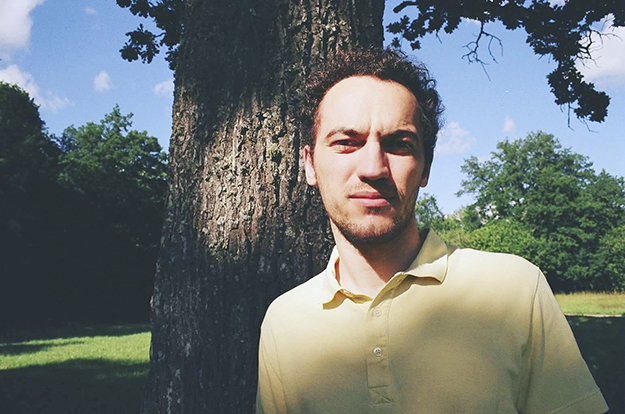
Vlorian Molliqaj, VV activist living in Sweden, war reported to the Police by KQZ for distributing an online form for helping the diaspora register to vote. Photo courtesy of Vlorian Molliqaj.
According to Vlorian Molliqaj, a Vetevendosje activist who lives in Sweden, diaspora issues with the registration procedures and other difficulties that they face are the main reasons why he and his friends have taken the initiative to help other members of the diaspora with this process.
“We created an online form on which everyone can write their contact information so that we can send them information regarding voting procedures by post”, he said for K2.0. But this action by Molliqaj, brother of Organizational Secretary of Vetëvendosje, Dardan Molliqaj, was not welcomed by the CEC, who reported the case to the police on May 12, the day he distributed the forms.
The CEC have also reacted publicly through the media saying that the forms distributed by Molliqaj were not official, despite having the CEC logo.
“The CEC’s form for this issue is completely different from the one that is circulating. With time, the Central Election Commission will give correct information regarding the period for Voting from Outside of Kosovo,” it was announced in a statement for the media on May 12.
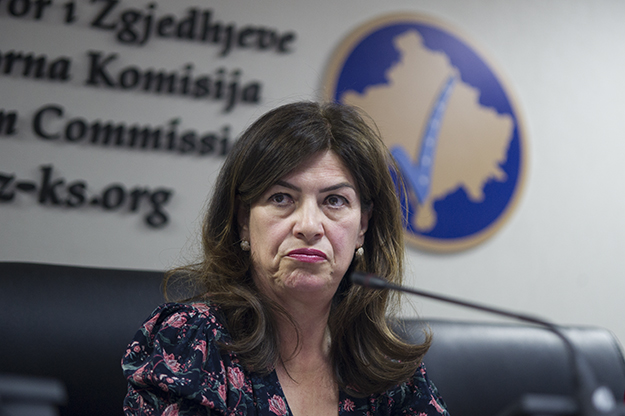
Valdete Daka, the head of CEC, mentioned chronic fatigue for her staff as one of the challenges of the election period. Photo: Atdhe Mulla / K2.0.
The Head of the CEC told K2.0 that they had reported Molliqaj to the Police because he had used the organization’s logo for personal interests. “We have reported the case, so it is up to the Police to investigate it further,” Daka said, not giving any further details regarding suspicions.
The Information Office of the Kosovo Police told K2.0 that the case had now been transferred to judicial bodies, stating that: “Regarding this case, we inform you that the Kosovo Police has undertaken all the necessary legal actions for treating and proceeding further this information/publication, and has also informed judicial bodies.”
Vlorian Molliqaj said that experiences in past elections are indicators that the CEC is “being controlled by the people in power,” and, according to him, they deliberately do not commit to enabling the diaspora to participate in elections by voting by post or through embassies and consulates of the Republic of Kosovo.
“A friend of mine asked me how I feel after all these accusations, and I jokingly answered “The CEC should pay me for all this work that I am doing, because this is in fact their job,” said Molliqaj, according to whom 2,000 persons were registered with his forms.
Zejna of Demokracia Plus said that Kosovar diaspora are continuously discriminated in the voting process, because the procedure for registering is initially very complicated, and so is the subsequent voting procedure.
“There are now education campaigns for diaspora to inform them with time about the requirements of the registration process and other conditions. The diaspora has never been a priority for CEC, and they are not a priority in these elections either. The fact that these elections must be organized within such a short period only serves to make the voting process for the diaspora all the more difficult”, Zejna said.
Valdete Daka justified all these accusations with the short organization period for elections, and did not take responsibility as CEC.
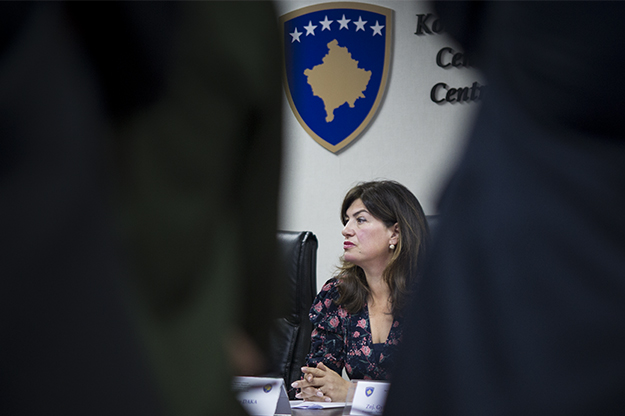
Head of the CEC, Valdete Daka. Photo: Atdhe Mulla / K2.0.
In a short interview with Radio Free Europe, Daka said that early elections are always challenging. “All the more so now that we have a minimum period of 30 days, and that not more than two weeks are left,” she said.
Speaking about challenges, she mentioned voting from abroad. “We have been unjustly attacked and accused, as if we are deliberately preventing voters from the diaspora, which is completely untrue,” Daka said, not forgetting to mention the personal lives and chronic fatigue that the CEC staff feel. “There are many more challenges, starting from the most banal ones, such as the chronic fatigue felt by all CEC staff, members, including myself,” she continued. “We do not have time for our families or personal lives.”
Nevertheless, elections are approaching and Daka and her officials will surely have much more work to do, since only a few days are left until the day in which we will choose who will be part of our new legislature. Until then, it is up to the people to decide who deserves to lead the country.K
Feature image: Atdhe Mulla / K2.0.









